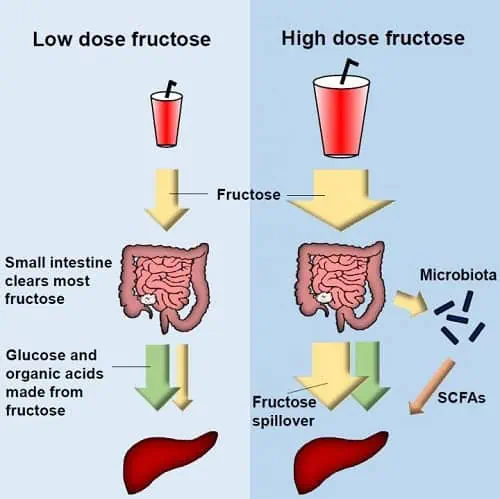
High-dose fructose can cause or worsen insulin resistance, abdominal weight gain, fatty liver, heavy periods, and PCOS.
High-dose fructose comes from table sugar (sucrose), high-fructose corn syrup, and even some natural sweeteners such as agave, coconut sugar, dates, dried fruit, and fruit juice.
Whole fruit is healthy and does not cause insulin resistance because 1) whole fruit contains only low-dose fructose, and 2) fruit also provides beneficial nutrients, fibre, and polyphenols.
How high-dose fructose drives or worsens insulin resistance
Fructose has a relatively low glycemic index compared to glucose and so is less stimulating to insulin. That’s a good thing, and low-dose fructose from fruit can actually improve insulin sensitivity, especially in the context of high physical activity.
Furthermore, at a low to moderate dose, most fructose is converted to glucose and organic acids in the small intestine before it can ever reach the liver or microbiome.
High-dose fructose is different because it can overwhelm the small intestine’s ability to convert fructose to glucose. That results in fructose reaching the liver and microbiome and inducing intestinal permeability, oxidative stress, inflammation, and fatty liver—all leading, in turn, to an increased risk of insulin resistance.

According to Princeton researcher Joshua D. Rabinowitz:
“There is a fundamental physiological difference in how smaller and larger amounts of sugar are processed in the body.”
“Fructose from moderate amounts of fruits will not reach the liver. However, the small intestine probably starts to get overwhelmed with sugar halfway through a can of soda or large glass of orange juice.”
How much fructose is okay?
You don’t need to avoid all fructose. Fructose is a normal and healthy component of fruits and vegetables.
You may not even need to avoid high-dose fructose if you’re active and don’t overeat because high-dose fructose is only a problem in the context of high-calorie intake and low physical activity. That means you probably get away with some low-sugar desserts such as homemade crumble or coconut cream blended with banana and frozen berries.
If you’re not active, however, or if you have insulin resistance, you should definitely think about reducing high-dose fructose. And that means avoiding sweet drinks and desserts, even desserts made with many so-called “natural sugars.” Read: Reverse insulin resistance in 4 easy steps.
👉🏽 Tip: The only way to know if you have insulin resistance is to test the hormone insulin. Having polycystic ovaries means nothing and can actually be associated with hypothalamic amenorrhea or undereating.
I know getting off sugar can be hard. Here is the plan I use with patients.
How to overcome sugar cravings
- Eat enough protein, especially with your first meal because protein is highly satiating and will reduce cravings.
- Eat full, satisfying meals that include all three macronutrients: protein, starch, and fat. In other words, don’t attempt to restrict calories or carbs while you’re trying to get off sugar.
- Get enough sleep because sleep reduces sugar cravings.
- Supplement magnesium because it helps sleep and reduces cravings.
- If you need a sweetener while you adapt to a low-sugar diet, try the natural sweeteners stevia or xylitol.
- Pick a start date during a lower-stress time in your life.
- Go cold turkey off all desserts and dessert-type foods for four weeks.
- Know that intense cravings will subside after twenty minutes.
- Know that all cravings will subside after seven days.
- Know that by reversing insulin resistance you will help to prevent cravings from coming back.
- Know that you’re okay. You’re not a bad person just because you crave sugar or binge on sugar.
If you find that giving up sugar is really, really hard and that you continuously relapse, consider that you may have a true sugar addiction and reach out for help.
Ask me in the comments.
